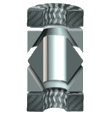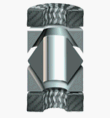
Product Overview: Enviroflex™ 500 – the Answer to Fugitive Emissions
Product Overview: Enviroflex™ 500
The Answer to Fugitive Emissions
PRODUCT REFERENCE | ENVIROFLEX™ 500 | |||||||
DESCRIPTION | Enviroflex™ 500 is a low emission valve stem sealing system.  Enviroflex™ 500 is supplied as a five ring set, consisting of three moulded graphite rings and two braided header rings specially formulated from high performance carbon yarn. The moulded graphite rings are entirely free of PTFE but there is a small amount in the header rings. Where the PTFE is of concern as a potential source of corrosion, then Enviroflex™ 506 is the appropriate form to select. | |||||||
SERVICE | Enviroflex™ 500 has been developed for use in Linear and Rotary valves, both control and hand operated. Enviroflex™ 500 has exceeded the most stringent requirements for fugitive emissions, resulting in less product loss and reduced emission penalties. Enviroflex™ 500 has Fire Test approval in accordance with API 607.
* Not recommended for use with strong oxidising agents. ** For service above 350°C, the temperature at which PTFE will start to decompose and cause stem corrosion, Enviroflex™ 506 is recommended as it is entirely free of PTFE. Please note that statements of operating limits are not an indication that these values can be used simultaneously or that they apply in all chemical media. | |||||||
| AVAILABILITY | Enviroflex™ 500 can be manufactured in sizes to fit stuffing boxes of most valves, and is available as split ring form . Please contact our sales offices for further details. | |||||||
This Data Sheet relates to the material as supplied. The information contained herein is given in good faith, but no liability will be accepted by the Company in relation to same. | ||||||||
HEALTH AND SAFETY
Because of the processes which take place during manufacture, the product is believed to present no health and safety hazard and, under normal handling and use it is unlikely that the product will give rise to significant levels of exposure to constituent materials.
ENVIROFLEX™ 500 contains graphite, carbon yarn, PTFE and a lubricant.
Under harsh mechanical treatment (e.g. abrasion) the constituents may give rise to irritant dust which, in extreme cases of exposure, could lead to more serious respiratory problems. Occupational exposure to such dusts should therefore be minimised and kept below relevant national exposure limits. Good standards of hygiene should be applied during cutting, installation and removal and packing residues should be disposed of by transfer to a site appropriately licensed to accept industrials materials of this nature.
Although the constituents are non-flammable, at elevated temperatures or in a sustained fire, decomposition will occur and give rise to irritant, and in some instances harmful or toxic fumes.
For more detailed information, reference must be made to our Health and Safety Bulletin, Sections 1, 2, 2.6, 2.8. 2.10, 2.11, 3, 3.2 and 3.4. This will enable you to carry out any necessary assessment of risk which may be required under national or local legislation.